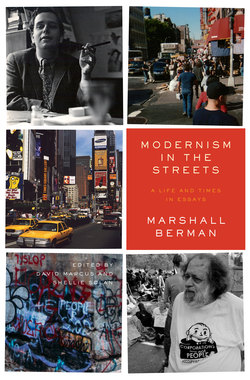Читать книгу Modernism in the Streets - Marshall Berman - Страница 10
На сайте Литреса книга снята с продажи.
The Politics of Authenticity
ОглавлениеThe idea that I have called “the politics of authenticity” is a dream of an ideal community in which individuality will not be subsumed and sacrificed, but fully developed and expressed. This dream is at once old and new. “New,” first of all, in that it is modern: It presupposes the sort of fluid, highly mobile, urban society, and the sort of dynamic, expansive economy which we experience as distinctively modern, and which nearly everyone in the West lives in today. But it is “old” too: It has been a leitmotif in Western culture since early in the eighteenth century, when men began to feel modernization as an irreversible historical force and to think systematically about its human potentialities. This ideal was one of the deepest and most pervasive themes of the Romantic Age, the years roughly from 1789 to 1848. It is central to the work of Blake and Carlyle, of Chateaubriand and Stendhal, of Schiller and Novalis and Hegel. Marx and Engels invoke it in the Communist Manifesto: “In place of bourgeois society, with its classes and class conflicts, we will have an association in which the free development of each will be the condition of the free development of all.”
The Manifesto appeared in 1848, on the eve of the revolutions that would bring to a climax a century of Romantic dreams. But this climax turned out to be a catastrophe: The defeats of 1848 to 1851 generated a disenchantment and despair so deep that the very memory of the dream was lost, wiped out, submerged; for a whole century, the politics of authenticity virtually disappeared from the Western imagination. Thus, from the start of the 1850s to the end of the 1950s, in nearly all arguments between radicals and their opponents, both parties identified the capitalist economy and the liberal state with “individualism” and equated radical aims with a “collectivism” that negated individuality. Political thought was frozen into this dualism until the cultural explosion of the 1960s redefined the terms. The New Left’s complaint against democratic capitalism was not that it was too individualistic, but rather that it wasn’t individualistic enough: It forced every individual into competitive and aggressive impasses (“zero-sum games”) which prevented any individual feelings, needs, ideas, energies from being expressed. The moral basis of this political critique was an ideal of authenticity. This outlook was new and yet old, radical yet traditional. Thus the New Left’s lasting cultural achievement—one that may outlive the New Left itself—has been to bring about a return of the repressed, to bring radicalism back to its romantic roots.
When I first thought of writing a book on “the politics of authenticity,” American culture had come very close to those roots. But the road was murky and tortuous, and no one knew how close we all were. I was just coming of age then, and the 1950s were beginning to turn into the 1960s. The teachers who were teaching me most, in the fervidly genial atmosphere of Columbia College, were thinking very intensely and deeply about “the self” as an intellectual and cultural problem. They had good reasons of their own for thinking this way. They had been burned badly by the radical politics of the 1930s, a politics that had led them to the verge of a monstrous self-betrayal, or of a nightmarish self-dissolution. Now, shaken but intact, reincarnate as academic humanists and cultural critics, they were hoping to salvage whatever elements of decency and beauty they could find in a wrecked, bleak world and to put together fragmented but honest lives for themselves. Their concern with personal authenticity grew out of a loss of political faith, hope, and love. And yet, even though they had cut themselves off from all radical movements, there was some thing unmistakably radical in the way they moved. Although they denounced every Romantic hope, we could see something vividly and beautifully Romantic about the very intensity of their despair. Even as they spurned and cursed Marxism for its spiritual emptiness, they themselves embodied a different kind of Marxism, a Marxism with soul. The vibrations they unconsciously gave off were far more powerful than the ideology (or, as they would have said, anti-ideology) they tried so hard to transmit. Ironically then, so many of the great teachers of that time opened doors for their students which they had closed on themselves; they turned us on to currents of desire and hope, of feeling and thought, which they hoped to turn off forever.
Thus the same sensibility and awareness, which led them away from politics and from radicalism in the 1940s and 1950s, led us back to politics and into a new kind of radicalism in the 1960s. The upheavals of these last years have generated a bitter conflict of generations in American intellectual life. In trying to clarify the political consequences of the search for personal authenticity, I have focused on an ultimate concern, which I believe both generations share. If we all come to understand what is involved in the desire to be ourselves, it may bring us closer together than we have been.
This essay first appeared as the preface to the first edition of The Politics of Authenticity, Cambridge: Atheneum, 1970.
